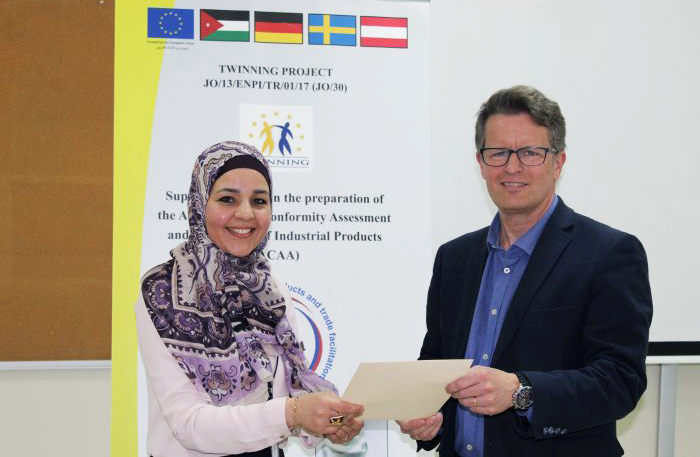This initiative is what is known as a twinning project, an EU programme where authorities and officials from EU member states share their knowledge with institutions in countries outside the EU. The objective is to facilitate cooperation between the EU and the recipient country.
“The project, which was a collaboration between Sweden, Germany and Austria, is the result of Jordan’s desire to bring its systems more in line with EU legislation within various fields in order to facilitate trade in the long term,” says Viktoria.
Swedac’s contribution primarily involved providing support and training to develop the Jordanian accreditation body, and the organisation also assisted in supporting accreditation activities so that they can eventually apply for international acceptance within three new accreditation areas. Swedac also had a lawyer on the ground who arranged workshops on impact assessments in order to improve the quality of laws and other regulations.
Viktoria Lindberg Martinell, who managed Swedac’s side of the project, made eight visits to the Jordanian capital of Amman. “The body we worked with in Jordan was very proactive and a positive counterpart. It was impressive to see how they approached this and how open they were to absorb new knowledge. This made our part of the collaboration simple,” says Viktoria, who feels she has gained a valuable insight into how Jordan deals with such matters.
Several employees from Swedac have been on the ground in Jordan and have seen the challenges the country is facing.
“Jordan now needs to build up systems that can increase confidence in authorities, for one thing. Just because they are introducing new regulations for certain products or checks on safety-related products, it doesn’t mean that these will automatically be complied with by inhabitants and companies unless you can also clearly show the benefit to society,” says Viktoria.
Swedac’s accreditation expert Magnus Pedersen sees several advantages to the project:
“If Sweden can help reinforce accreditation in Jordan and similar countries, this will increase opportunities for trade between countries, as they will have a stable quality infrastructure. Moreover, the project may contribute to economic growth and improved security for citizens in one of Europe’s neighbour states,” he says.
“For Swedac, the project also meant that we built up a valuable network with the other stakeholders in Germany and Austria,” says Viktoria.


